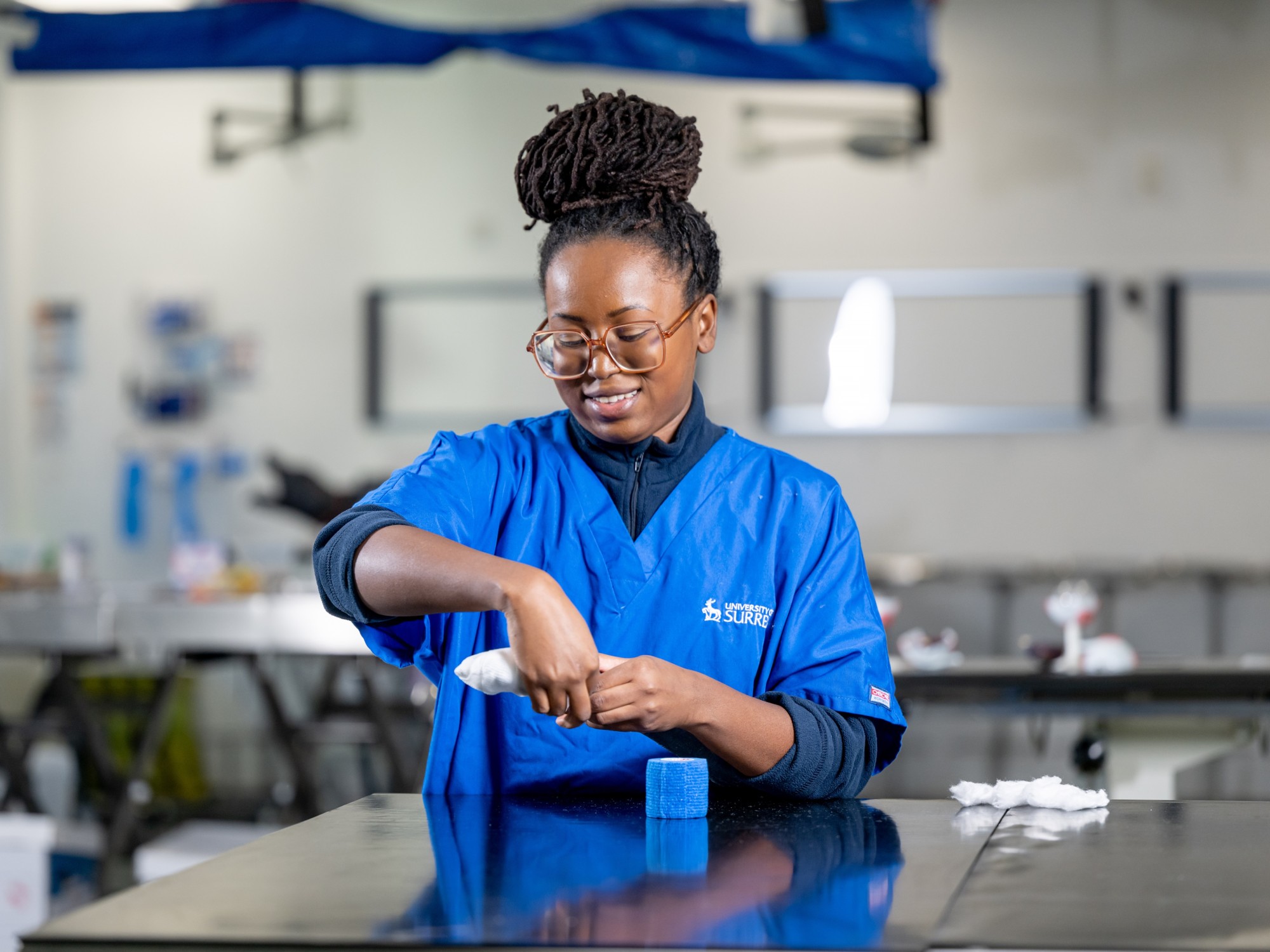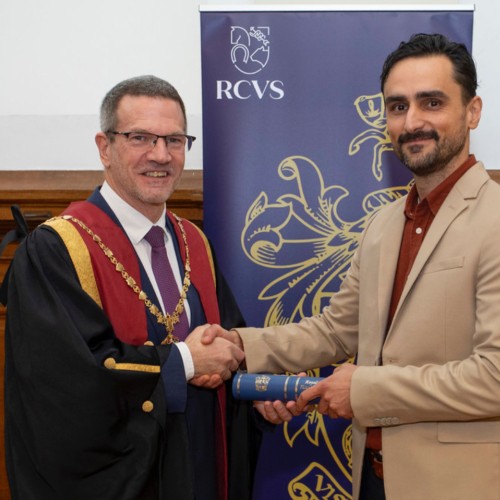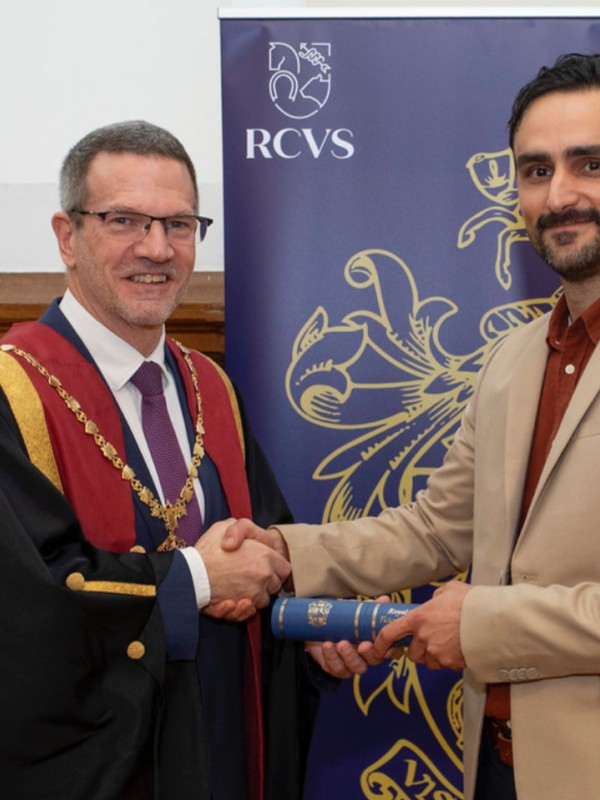
- Veterinary General Practice
PGCert — 2026 entry Veterinary General Practice
Whether your aim is to sit the statutory membership examination for the Royal College of Veterinary Surgeons, return to veterinary practice after a break, or gain new skills, our Veterinary General Practice PGCert provides the foundational knowledge you need to take the next step in your career.
4,138+ people have created a bespoke digital prospectus
Why choose
this course?
- Study on a course that has been designed and supported by veterinary educators with a wealth of general practice experience.
- Gain a thorough understanding of the skills and attributes required for veterinary general practice in the UK. This UK Level 7 qualification will help international veterinarians prepare for the Royal College of Veterinary Surgeons (RCVS) statutory membership examination. We have a successful track record of students completing our course and becoming members of the RCVS.
- Expand your existing professional knowledge and skill set to advance your career or gain the support and guidance necessary to return to veterinary practice in the UK after a career break.
- Benefit from a flexible, online course structure, with access to an extensive virtual library of learning materials.
- Access our state-of-the-art clinical skills laboratories during a two-week visit to our School of Veterinary Medicine at the end of the course to prepare for and sit your final exams.
Please note: you must have a veterinary degree to apply for this course.
Statistics
100%
Of graduates from our School of Veterinary Medicine are in employment or further study within 15 months of graduating (Graduate Outcomes 2025, HESA)
What you will study
On this course, you will learn about the skills and attributes required in the UK for small animal general practice, equine general practice, production animal general practice, and veterinary public health, pathology and professional skills.
You will be taught the Day One Competencies that are required for new graduate veterinarians, as established by the RCVS.
You will also learn the importance of sustainability, employability, resourcefulness and resilience, digital capabilities, and global and cultural awareness and how they relate to the role of a veterinarian.
Facilities
At the end of the course, you'll spend two weeks at our School of Veterinary Medicine to sit your final exams. To prepare for this, you'll have access to our multimillion-pound veterinary clinical skills facilities. These spaces are fitted with the latest teaching equipment, including electrocardiogram (ECG) monitors and simulators, that you'll use to practise procedures and skills such as surgical procedures, anaesthesia, intravenous and urinary catheterisation, life support and resuscitation, suture placement, venepuncture and more.
The academic year is divided into two semesters of 11 weeks each. The course is conducted online and formal teaching will take place in semester 1.
In semester 2, you will be required to spend two weeks at our School of Veterinary Medicine where you will have practical clinical skills sessions followed by related examinations.
Where possible this course has been structured to align with the dates of the RCVS statutory membership examination. Visit the RCVS website for more information.
The structure of our programmes follows clear educational aims that are tailored to each programme. These are all outlined in the programme specifications which include further details such as the learning outcomes:
Modules
Modules listed are indicative, reflecting the information available at the time of publication. Modules are subject to teaching availability, student demand and/or class size caps.
The University operates a credit framework for all taught programmes based on a 15-credit tariff, meaning all modules are comprised of multiples of 15 credits.
Course options
Year 1
Semester 1
Compulsory
This module involves the theoretical study of companion animal clinical practice with specific reference to identification of clinical problems, establishment of a list of appropriate differential diagnoses, the logical selection of appropriate laboratory tests and diagnostic procedures (including diagnostic imaging), logical interpretation of results and the formulation of an appropriate treatment (medical and/or surgical) and/or management plan (including nutrition) for the individual small animal patient.
View full module detailsThis module reviews first opinion equine practice with specific reference to clinical problems, differential diagnoses, further investigations (lab tests, diagnostic imaging etc), logical interpretation of results and the formulation of appropriate treatment regimens (including medical, surgical, husbandry plans and nutrition).
View full module detailsThis module is relevant to production animal species and reviews production animal practice in the UK, clinical reasoning shills, husbandry, nutrition, pharmacology, anaesthesia, surgery, theriogenology, disease, population health and management.
View full module detailsSemester 1 & 2
Compulsory
This module addresses Veterinary Public Health with respect to RCVS Day 1 competencies and considers professionalism. It outlines the principles of public health legislation relevant to veterinary surgeons including food safety practices, general epidemiology and certification, ethics and veterinary professionalism. It will introduce students to the performance of a systematic gross post-mortem examination, as well as performance of a PM inspection in the abattoir. This module will prepare students for topics pertinent to professional practice such as communication and lifelong learning. Students will be able to understand the knowledge skills and attributes required for Veterinary Public Health and Professionalism in veterinary practice in the UK.
View full module detailsYear 1
Semester 1
Compulsory
This module involves the theoretical study of companion animal clinical practice with specific reference to identification of clinical problems, establishment of a list of appropriate differential diagnoses, the logical selection of appropriate laboratory tests and diagnostic procedures (including diagnostic imaging), logical interpretation of results and the formulation of an appropriate treatment (medical and/or surgical) and/or management plan (including nutrition) for the individual small animal patient.
View full module detailsThis module reviews first opinion equine practice with specific reference to clinical problems, differential diagnoses, further investigations (lab tests, diagnostic imaging etc), logical interpretation of results and the formulation of appropriate treatment regimens (including medical, surgical, husbandry plans and nutrition).
View full module detailsThis module is relevant to production animal species and reviews production animal practice in the UK, clinical reasoning shills, husbandry, nutrition, pharmacology, anaesthesia, surgery, theriogenology, disease, population health and management.
View full module detailsOptional modules for Part-time (Year 1) - FHEQ Level 7
Students must select 30 credits worth from:
VMSM002
VMSM003
VMSM004
Year 2
Semester 1
Compulsory
This module involves the theoretical study of companion animal clinical practice with specific reference to identification of clinical problems, establishment of a list of appropriate differential diagnoses, the logical selection of appropriate laboratory tests and diagnostic procedures (including diagnostic imaging), logical interpretation of results and the formulation of an appropriate treatment (medical and/or surgical) and/or management plan (including nutrition) for the individual small animal patient.
View full module detailsThis module reviews first opinion equine practice with specific reference to clinical problems, differential diagnoses, further investigations (lab tests, diagnostic imaging etc), logical interpretation of results and the formulation of appropriate treatment regimens (including medical, surgical, husbandry plans and nutrition).
View full module detailsThis module is relevant to production animal species and reviews production animal practice in the UK, clinical reasoning shills, husbandry, nutrition, pharmacology, anaesthesia, surgery, theriogenology, disease, population health and management.
View full module detailsSemester 1 & 2
Compulsory
This module addresses Veterinary Public Health with respect to RCVS Day 1 competencies and considers professionalism. It outlines the principles of public health legislation relevant to veterinary surgeons including food safety practices, general epidemiology and certification, ethics and veterinary professionalism. It will introduce students to the performance of a systematic gross post-mortem examination, as well as performance of a PM inspection in the abattoir. This module will prepare students for topics pertinent to professional practice such as communication and lifelong learning. Students will be able to understand the knowledge skills and attributes required for Veterinary Public Health and Professionalism in veterinary practice in the UK.
View full module detailsOptional modules for Part-time (Year 2) - FHEQ Level 7
Students must select the remaining 15 credits worth from (this module must not have been taken in year 1 previously):
VMSM002
VMSM003
VMSM004
Plus VMSM005
Teaching and learning
This course is delivered through online learning. All the module materials will be available on our virtual learning platform, SurreyLearn. You will have access to step-by-step instructional documents and videos, covering all Day One skills required for veterinary practice. You will also be able to join live interactive sessions hosted by academics from our School of Veterinary Medicine throughout the course.
At the end of the course, you will be required to visit us in person for an intensive two-week period in which you will receive clinical skills teaching and undertake an assessment of your practical ability.
Assessment
You will be required to take an online examination at the end of the first semester. You will finish the course by taking objective structured clinical examinations (OSCEs) in person at our School of Veterinary Medicine, located on Surrey’s Manor Park campus.
Your examinations will be assessed by Surrey academics, some of whom have been RCVS examiners.
General course information
Contact hours
Contact hours can vary across our modules. Full details of the contact hours for each module are available from the University of Surrey's module catalogue. See the modules section for more information.
Timetable
New students will receive their personalised timetable during Welcome Week. In later semesters, at least one week before the start of the semester.
Scheduled teaching can take place on any day of the week (Monday – Friday), with part-time classes normally scheduled for one or two days. Wednesday afternoons tend to be for sports and cultural activities.
View our code of practice for the scheduling of teaching and assessment (PDF) for more information.
We offer careers information, advice and guidance to all students whilst studying with us, which is extended to our alumni for three years after leaving the University.
Whether your aim is to register with the RCVS to practise in the UK, gain a PGCert to expand your skill set, or return to the workforce after a career break, this course will provide you with the necessary support and training.
Veterinarians who are not registered with the RCVS must pass the RCVS statutory membership examination to practise in the UK. Completion of this PGCert will provide you with the knowledge and understanding required to prepare for the exam, and we have a successful track record of students completing our course and becoming members of the RCVS.


Hanna
Student - Veterinary General Practice PGCert


Pedro
Graduate - Veterinary General Practice PGCert
UK qualifications
A minimum of a 2:2 UK honours veterinary degree, or a recognised equivalent international qualification.
International students travelling to the UK
Due to the module structure of this programme, we are unable to provide sponsorship on the Student Route. International students should make use of the Visitor Visa Route to attend the practical component of the programme. Further details can be found on our apply for a visa page.
Unfortunately, the University cannot guarantee that Visitor Visa applications will be successful, and a refusal may result in students being unable to successfully complete the programme.
English language requirements
IELTS Academic: 7.0 overall with 7.0 in each element.
These are the English language qualifications and levels that we can accept.
If you do not currently meet the level required for your programme, we offer intensive pre-sessional English language courses, designed to take you to the level of English ability and skill required for your studies here.
Credit Transfer and Recognition of Prior Learning
We recognise that many students enter their course with valuable knowledge and skills developed through a range of ways.
If this applies to you, the recognition of prior learning process may mean you can join a course without the formal entry requirements, or at a point appropriate to your previous learning and experience.
There are restrictions for some courses and fees may be payable for certain claims. Please contact the Admissions team with any queries.
Scholarships and bursaries
Discover what scholarships and bursaries are available to support your studies.
Fees
Explore UKCISA’s website for more information if you are unsure whether you are a UK or overseas student. View the list of fees for all postgraduate courses.
September 2026 - Full-time with Distance Learning - 1 year
- UK
- £4,700
- Overseas
- £5,800
September 2026 - Part-time with Distance Learning - 22 months
- UK
- £2,400
- Overseas
- £2,900
- The dissertation module is charged as a 15-credit module for fee purposes
- These fees apply to the academic year 2026-27 only. Fees are reviewed annually, and tuition fees may increase for courses running over more than one year.
Payment schedule
- Students with Tuition Fee Loan: the Student Loans Company pay fees in line with their schedule (students on an unstructured self-paced part-time course are not eligible for a Tuition Fee Loan).
- Students without a Tuition Fee Loan: pay their fees either in full at the beginning of the programme or in two instalments as follows:
- 50% payable 10 days after the invoice date (expected to be October/November of each academic year)
- 50% in January of the same academic year.
- Students on part-time programmes where fees are paid on a modular basis: cannot pay fees by instalment.
- Sponsored students: must provide us with valid sponsorship information that covers the period of study.
The exact date(s) will be on invoices.
Additional costs
You will need to cover the costs of travelling to the UK for the two-week residential visit (usually in April) at our School of Veterinary Medicine. This includes accommodation and travel to the campus while you are here.
Apply online
To apply online first select the course you'd like to apply for then log in.
Select your course
Choose the course option you wish to apply for.
Sign in
Create an account and sign into our application portal.
Please note that we may have to close applications before the stated deadline if we receive a high volume of suitable applications. We advise you to submit your application as soon as it is ready.
ApplyPlease note that we may have to close applications before the stated deadline if we receive a high volume of suitable applications. We advise you to submit your application as soon as it is ready.
ApplyAdmissions information
Once you apply, you can expect to hear back from us within 14 days. This might be with a decision on your application or with a request for further information.
Our code of practice for postgraduate taught admissions explains how the Admissions team considers applications and admits students. Read our postgraduate applicant guidance for more information on applying.
About the University of Surrey
Need more information?
Contact our Admissions team or talk to a current University of Surrey student online.
Terms and conditions
When you accept an offer to study at the University of Surrey, you are agreeing to follow our policies and procedures, student regulations, and terms and conditions.
We provide these terms and conditions at offer stage and are shown again at registration. You will be asked to accept these terms and conditions when you accept the offer made to you.
View our generic registration terms and conditions (PDF) for the 2025/26 academic year, as a guide on what to expect.
Disclaimer
This online prospectus has been published in advance of the academic year to which it applies.
Whilst we have done everything possible to ensure this information is accurate, some changes may happen between publishing and the start of the course.
It is important to check this website for any updates before you apply for a course with us. Read our full disclaimer.






